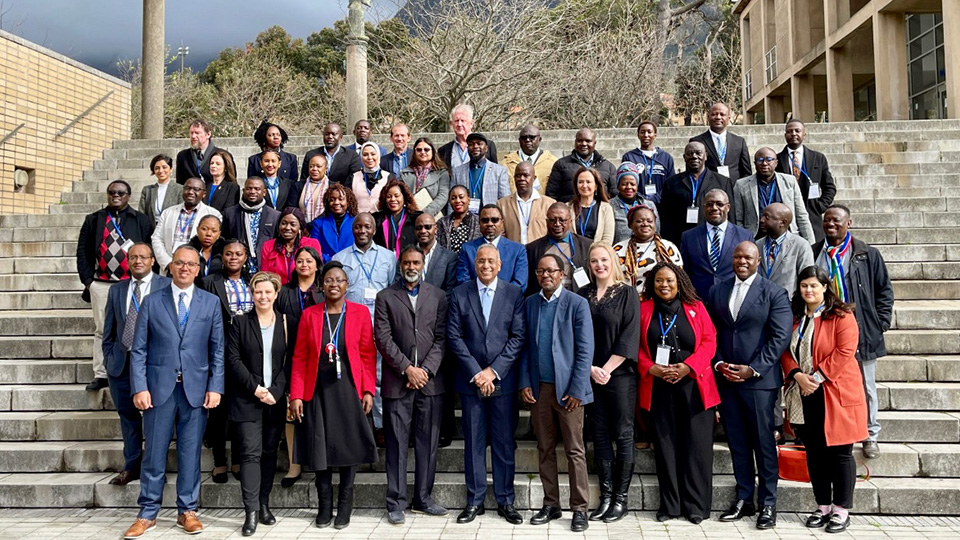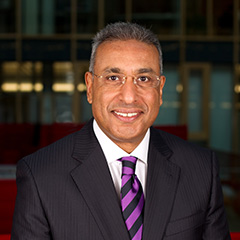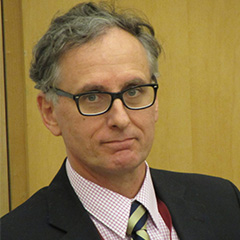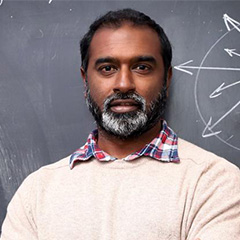Supporting IP Teachers and Researchers Across Africa
14 août 2024
The WIPO Academy teamed up with the World Trade Organization (WTO) and the University of Cape Town to organize the second regional colloquium for intellectual property (IP) teachers and researchers in Africa. The WIPO-WTO Colloquium for Africa was held from August 5 to 8, 2024 at the University of Cape Town middle campus in South Africa for the benefit of 66 participants from universities in Africa and beyond. The colloquium was followed by the second edition of the IP Scholars Africa (IPSA) Conference which was also held at the University of Cape Town and attended by 73 researchers on August 9, 2024.

Photo caption: Participants of the WIPO-WTO Colloquium for IP Teachers and Researchers in Africa
Mr. Sherif Saadallah, Executive Director of the WIPO Academy, Mr. Antony Taubman, Director of the IP Government Procurement and Competition Division at WTO, and Prof. Jeff Murugan, Acting Deputy Vice-Chancellor of Research and Internationalization at the University of Cape Town, delivered the opening remarks at the Colloquium alongside other senior officials and representatives from government and the University of Cape Town.
Ms. Jetane Charsley, Chief Director of the National IP Management Office of South Africa, Prof. Danwood Chirwa, Dean of the Faculty of Law at the University of Cape Town, and Prof. Michelle Louw, Head of the Commercial Law Department at the University of Cape Town also gave opening remarks at the WIPO-WTO Colloquium.
Ms. Martha Chikowore, Acting Head of the Academic Institutions and Executive Program of the WIPO Academy (who spoke on behalf of Mr. Sherif Saadallah, Executive Director of the WIPO Academy), Mr. Outule Rapuleng, Head of the African Regional Intellectual Property Organization (ARIPO) Academy, and Prof. John Dashaco Tambutoh, Coordinator of the WIPO Joint Master’s Program offered with the African Intellectual Property Organization (OAPI) and the University of Yaoundé II, opened the IPSA Conference.
What did the WIPO-WTO Colloquium cover?
The WIPO-WTO Colloquium provided IP teachers and researchers the opportunity to learn about the latest developments in IP, identify more effective ways to improve IP teaching and foster collaboration in high-quality IP research and publication in Africa. Participants got an in-depth understanding of:
- The role of regional IP organizations such as ARIPO and OAPI in enhancing IP education in Africa,
- Issues and developments in Africa in the areas of frontier technologies and digital copyright and related rights,
- IP research and teaching methodologies to build the capacity of universities in transforming ideas into tangible assets,
- Innovation and technology adaptation in Africa, and
- Ways to address climate change through environmentally friendly technologies and enable global public health through diversifying vaccine production and other key technologies to ultimately achieve the United Nations Sustainable Development Goals.
What did the IPSA Conference address?
Researchers at the IPSA Conference had the chance to represent their works-in-progress and gain feedback from peers. The research presented featured a regional focus and addressed topics such as:
- Computer-generated works, authorship and originality,
- Open-source solutions for the climate crisis,
- Thirty years of TRIPS flexibilities in Africa, and
- Promoting sustainable rural development through geographical indications.
The presentations developed by African academics at both the WIPO-WTO Colloquium and the IPSA Conference will be translated into articles that will be featured the next edition of the WIPO-WTO Colloquium Papers.
What are the organizers saying?

The WIPO Academy's collaboration with the WTO and the University of Cape Town (UCT) for the second editions of both the WIPO-WTO IP Colloquium and the IP Scholars Africa Conference brought over 73 leading academics and researchers to UCT. These events created a dynamic platform for the exchange of ideas on IP laws, policies, innovation, and sustainable development. The high-quality and thought-provoking presentations brought by African academics will be translated into the WIPO-WTO Colloquium publication. The success of both initiatives highlights the power of partnership in advancing robust IP education across Africa, whilst creating networking opportunities and addressing IP issues through scholarly publication for the benefit of all.
Mr. Sherif Saadallah, Executive Director of the WIPO Academy

The second session of the WIPO-WTO Colloquium for Africa has showcased an impressive range of scholarship from across the continent. Building on the foundation laid down in the first African regional colloquium, it further catalyzed valuable academic collaborations and strengthened research networks. The Colloquium program has a special place within the WTO's invaluable and wide-ranging program of collaboration with WIPO, as it aims to promote and consolidate the indigenous capacity across the developing world to conduct research and policy analysis in the field of IP, in turn building capacity to rethink and recalibrate the key elements of a knowledge economy geared to the contemporary challenges for sustainable development. The program demonstrated the power and depth of African scholarship in the field of IP and its interaction with public policy, and augurs well for future research endeavors. The special edition of the bespoke peer-reviewed journal, the WIPO WTO Colloquium Papers, that will ensue from this event will be essential reading.
Mr. Antony Taubman, Director of the Intellectual Property, Government Procurement and Competition Division of the World Trade Organization

The WIPO-WTO Colloquium and IP Scholars Conference provide an important platform for scholars to exchange views and ideas. The University of Cape Town is pleased to be a co-organizer and the local host of this group of scholars drawn from five continents and 22 countries, through the DSI-NRF Research Chair in IP, Innovation and Development. The topics being discussed, such climate change and environmentally friendly technologies, are of primary importance to Africa and indeed the rest of the world. They are not only timely but critical to the advancement of our collective knowledge.
Prof. Jeff Murugan Acting Deputy Vice Chancellor: Research and Internationalization at the University of Cape Town
Find out more
- What is intellectual property (IP)?
- WIPO Academy University Partnerships Program
- World Trade Organization (WTO)
- University of Cape Town
- African Intellectual Property Organization (OAPI)
- African Regional Intellectual Property Organization (ARIPO)
- Sign up for the WIPO Academy Highlights newsletter
- Join the WIPO Academy Community on LinkedIn